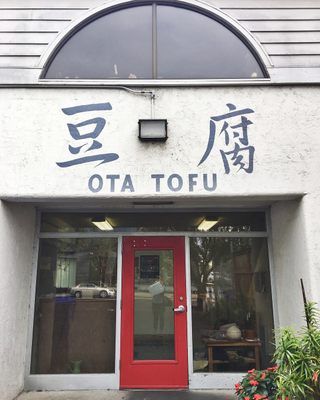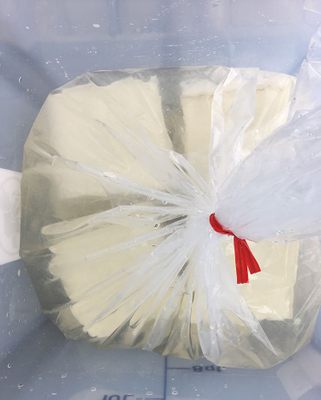About
In an unremarkable white building on a quiet Portland street, an icon of American food history sits humble and unaware of its own significance.
Ota Tofu’s origin story may have been lost to the churn of history, but its importance to Japanese-American foodways is crucial. Opened some time in 1911, this tofu shop has been making and packing tofu ever since. The shop began as Asahi Tofu, founded by an Ohta brother (at the time, the family used an Anglicized spelling of their surname) in partnership with another Japanese man, known only as Mr. Nagaro. It then moved to a new location nearby and took on the family name of the Ohtas, who had migrated from Okayama in Japan. In a marker of how little was known of Japanese cuisine in the early 1900s, Portland telephone directories listed the shop as a bakery selling “soy bean cakes.”
After Pearl Harbor and the passage of President Franklin D. Roosevelt’s executive order to incarcerate people of Japanese, Italian, and German ancestry, many Japanese in Portland were forcibly taken from their homes and put in internment camps. The Ohtas were interned as well, and Saizo Ohta, who owned the shop at the time with his wife, Shina, died in 1943 at the camp in Minidoka, Idaho. Luckily, the Ohtas’ landlord had been sympathetic to their plight and left the tofu shop intact for Mrs. Ohta to return to. By the 1980s, the family had reclaimed their Japanese surname, Ota. In 1981, the shop moved to its current location, with Shina Ota’s grandson, Koichi (who goes by Ko) at the helm. He modernized the traditional tofu-making process, and still works the machines on site. They also began making and selling soy milk in the 1980s, a popular item even today. Koichi Ota’s wife, Eileen, was the matriarch of Ota Tofu’s contemporary operations, but she retired in March 2019, handing the reins to new owners.
The red doors of the Ota plant open to a frenzy of activity. The factory floor is a hodgepodge of stacked plastic buckets and spotless steel surfaces, machines, and troughs. Workers maneuver the methodical chaos in teal overalls. The operations have always been small-scale, but fans rave about the tofu, and well-regarded Portland restaurants will not source their tofu from anywhere else. The factory staff soak, then grind, and cook the soybeans, then strain to separate the soy milk. The beancurd goes on cheesecloth-covered trays, and gets a good, long knead. It’s pressed into flat cakes on the tray and then cut by hand into individual pound-sized loaves. Finally, the tofu is ready to be packed into containers for sale.
Beside blocks of soft, medium, or firm fresh tofu, Ota Tofu also sells age, deep-fried flats of tofu that taste divine with a dash of soy sauce, some finely chopped scallions, and a sprinkling of bonito flakes.
Know Before You Go
If you bring your own containers, the shop offers a discount. They are cash only.
Community Contributors
Added By
Published
June 11, 2019
Sources
- https://books.google.com/books?id=gGrUNvZt0_YC&pg=PA2808&lpg=PA2808&dq=koichi+ota+tofu&source=bl&ots=IJkaJOy1G4&sig=ACfU3U2LhnaFwP11sVNGa4NNUF9Gs2ZP4w&hl=en&sa=X&ved=2ahUKEwieoMn05t_iAhUjiOAKHa0HC_IQ6AEwAnoECAcQAQ#v=onepage&q=koichi%20ota%20tofu&f=false
- https://slate.com/news-and-politics/2017/09/ota-tofu-the-secret-history-of-americas-oldest-tofu-shop.html





















